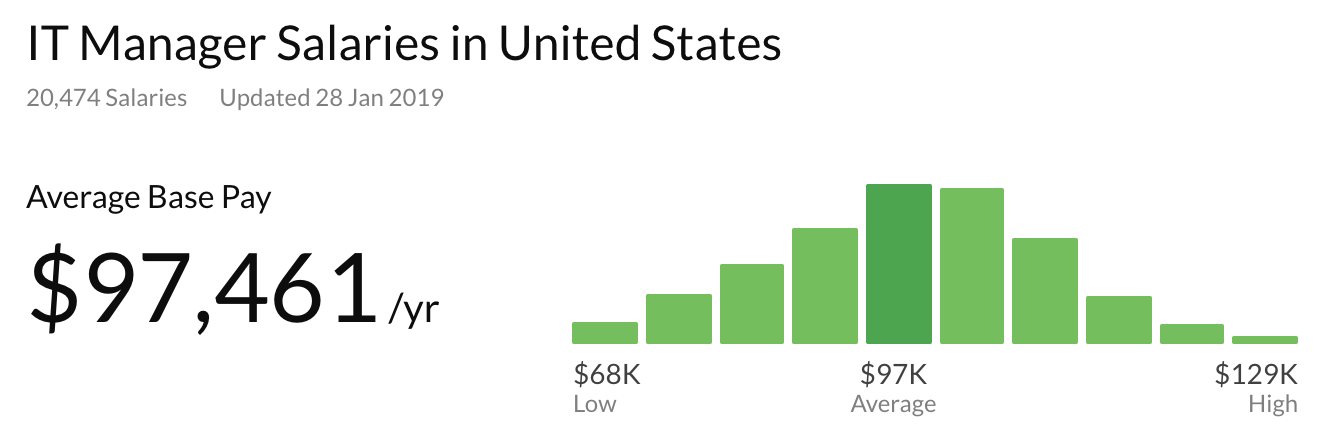Are you thinking about becoming an IT Manager? Great news! The demand to be on the IT Manager career path continuously grows by up to 15% yearly. Stepping into the technology industry gives you job security and the opportunity to work on ever-changing, innovative projects.
However, the IT Manager career path is by no means easy. This position is often responsible for managing large projects and overseeing an IT team. It requires an analytical mindset as well as strong business acumen. You’ll also need a solid foundation in technology whether that be through education and previous experience.
The good news is once you step into those IT Manager shoes, you open up doors to further your career in new ways. Practically 50% of IT Managers eventually get promoted to IT Director.
So, how does one become an IT Manager? Let’s take a look!
What is an IT Manager?
An IT Manager is responsible for managing information technology systems, increasing productivity, and solving any hardware or software issues. While one of the lower-level roles in the structure of an IT department, it still comes with the aspects of managing people and ownership of systems.
This role requires exceptional problem-solving skills, as those in this position typically have to troubleshoot technical issues. IT Managers need to be great communicators, as they’re often explaining complex problems to individuals at all levels and positions within an organization.
The two main skills needed to become a successful IT manager are leadership and data analytics skills.
This position requires a unique mix of technical knowledge and an understanding of business goals to be successful. Senior IT managers may be asked to prepare an RFP for a new phone system for the leadership to review and approve.
Related: Wise Words from 9 World-Dominating Women in Information Technology
IT Manager Responsibilities
We already went over two of the most significant skills you need to have when considering the IT Manager career path. But those skills come with their own set of responsibilities.
The IT Manager is responsible for managing projects and ensuring that technical improvements or issues are resolved quickly.
Here are the top five responsibilities of an IT Manager in any given organization:
- Leadership & Team Management
- Data Analytics
- Project Management
- Budgeting
- Information Systems
Leadership & Team Management
The IT Manager is responsible for their team, first and foremost. That means recognizing the need for growth, supervising productivity, and defining clear goals for their employees to meet. IT teams are essential to the success of any business.
Being able to manage their workforce effectively, provide guidance and feedback, and being a sounding board for major issues is a huge aspect of the role.
Data Analytics
Another helpful skill for an IT Manager to have is an education and understanding of Data Analytics.
The ability to predict business trends and client behavior will ensure the IT team is putting the best possible technology in place. Additionally, reporting on company data and security, and being able to interpret and communicate that data to their team, will help when it comes to planning and implementing new processes or programs.
These skills can make an IT Manager integral to business operations thanks to their research and knowledgeable insight on what works and what doesn’t.
Project Management
Like most IT roles, Project Management is a huge part of what an IT Manager does every day.
This role must be able to set objectives and goals and track a project through to the end.
That includes reporting on project progress, delegating tasks to their team, making necessary changes, and being able to recommend improvements on the fly.
Technology is always changing and new inventions pop up constantly in the IT world. So, the ability to manage them is one of the most critical aspects of an IT Manager.
Budgeting
While the IT Manager role is one of the first steps into the business side of an organization, an understanding of basic business operations can be very helpful.
This role is typically in charge of building out the annual budget and adhering to it. They’ll likely be responsible for aligning many of their department goals with business operations. Understanding the inner workings of the organization and how it functions is incredibly helpful.
Information Systems
Having an understanding of computer hardware and software, databases, data warehouse management, and telecommunications is another responsibility of the IT manager.
Much of what you’ll be managing day-to-day falls within these areas. Knowing how to troubleshoot, fix, and implement new systems will make anyone in this role successful.
For instance, you might need to add employees to your company’s phone system, often called a PBX. Not sure what an IP PBX is? Catch up in less than two minutes in the video below.
If there’s any experience you can gain throughout your career before you step into this role, this is it.
Related: IT Director Interview Questions + Answers to Get Hired
IT Manager Salary

According to Glassdoor, IT Managers earn an average salary of $97.46k annually before any bonuses or profit-sharing benefits. Compared to lower-level positions such as a Software Developer or Computer Systems Analyst, this is a high-paying role.
Though the range for this salary can fall anywhere from 84k to 156k, depending on location and industry, it still falls within the higher range of technology salaries on a non-executive level. Needless to say, the hard work you put in to manage the expectations of this role are rewarded.
Ready to Be on the IT Manager Career Path?
The career path for an IT Manager can vary greatly, as what is most important when companies are hiring for this role is the experience of each individual. Here are some of the positions one might have held previously or will go on to fill throughout their IT Manager career path.
- Software Engineer
- Program Manager, IT
- Senior Project Manager, IT
- Director of IT Services
- VP, Information Technology
- Chief Information Officers
As you can see, there are many options when it comes to stepping into this role. Whether it’s your salary expectations or your ideal career goal, becoming an IT Manager can help you gain the experience to go anywhere within the technology industry.
In addition to having a solid career laid out for you, technology is one of the fastest-growing industries with lots of opportunity for career growth. If you are looking for an innovative career that will always keep you on your toes, working in technology is a step in the right direction.



